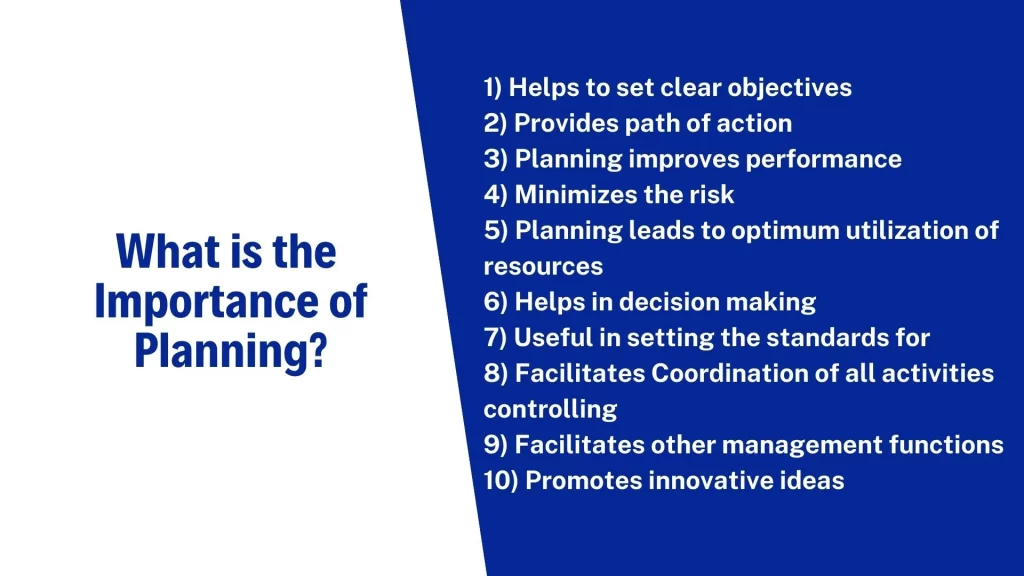What is the Importance of Planning? | Free Management Blogs
What is the Importance of Planning?

Meaning of Planning
Planning is the basic function of management. Every function of management is based on planning. It includes deciding the things to be done in advance.
Planning is an intellectual process of logical thinking and rational decision making. It focuses on organization’s objectives and develops various courses of action.
Designing a proper planning and implementing accordingly is the key of achieving the objectives of an organization.
According to Koontz and O’Donnell:
“Planning is deciding in advance what to do, how to do it, when to do it, and who is to do it. Planning bridges the gap from where we are and where we want to go it makes possible things to occur which would not otherwise occur.”
- Nature of Principle of Management
- Importance of Principles of Management
- Henri Fayol 14 Principles of Management
- Scientific Principles of Management
- Techniques of Scientific Management
What is the Importance of Planning in Management?
1) Helps to set clear objectives
Planning is concerned with setting objectives, targets, and formulating plans to achieve them. It helps managers to analyze the present condition of the organization and on that basis to identify the ways of attaining the desired position in future.
2) Provides path of action
Planning ensures that the goals or objectives are clearly stated. They act as a guide and they provide direction for doing the right things at the right time with right way. It helps employees to know what organization has to do and what they must do for achieving the goals.
3) Planning improves performance
It helps managers to improve future performances of employees by establishing objectives and selecting a course of action. Planning leads to efficient working of the employees. Due to proper planning, the employees can work according to timely guidelines. This improvement in performances results into higher profitability of the organization.
4) Minimizes the risk
Planning is based on forecasting technique. It is the process of looking into the future and anticipating the future changes. By deciding in advance the tasks to be performed, planning shows the way to deal with changes and uncertain events. Changes or risks cannot be eliminated totally but they can be anticipated and can be tackled with preventive measures. It minimizes the risk of future or uncertainties of future.
5) Planning leads to optimum utilization of resources
Organizational plans are prepared by taking into consideration the availability of resources and proper allocation of resources for various activities. It also facilitates optimum utilization of resources which brings higher efficiency and better results. One can avoid wastage of resources by proper planning.
6) Helps in decision making
There are various alternatives in front of the management. For achieving goals planning helps the management to select the best alternative by considering all positive and negative outcomes of all the alternatives. Decisions are taken after selecting alternative courses of action to achieve a predefined goal.
7) Useful in setting the standards for controlling
Planning set out standards for controlling. So, the actual performance can be compared with the standards and managers can find out the deviation, if any between the actual and the standard performance. Such deviation can be bridged by taking controlling steps. Therefore, planning provides basis for control.
8) Facilitates Coordination of all activities
Planning facilitates the coordination of activities. It reduces overlapping among activities. All activities of business organization are closely linked with each other which is considered in the process of planning. Sound planning inter-relates all the activities and resources of an organization. Thus, various departments work as per the overall plan and coordination is achieved.
9) Facilitates other management functions
Every organisation functions towards achieving goal and goal is set at the planning stage. Unless the plan is ready, other management functions such as organizing, staffing etc. cannot be undertaken thus, planning facilitates all other functions of management.
10) Promotes innovative ideas
Planning is the basic function of management. It is a process of decision making which involves promotion of innovative ideas after critical thinking. Ultimately, these innovative plans result into attainment of the goals of the organization. It is the most challenging activity for the management as it guides all future actions leading to growth and prosperity of the organization.


